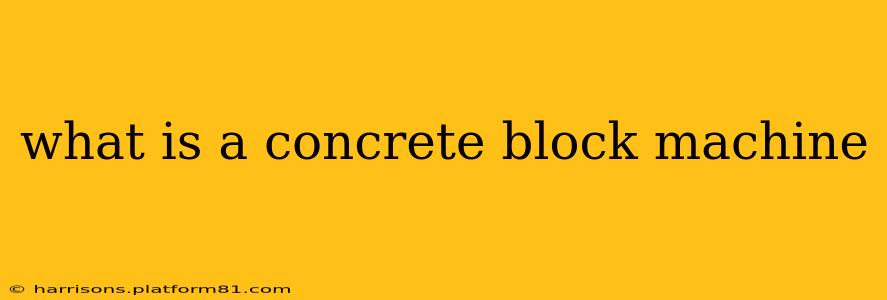A concrete block machine, also known as a concrete block making machine or cement block machine, is a piece of equipment used to manufacture concrete blocks (also called cinder blocks, concrete masonry units or CMUs). These machines automate the process of creating these versatile building materials, significantly increasing production speed and efficiency compared to manual methods. They range from small, manually operated machines suitable for individual projects to large, automated industrial plants capable of producing thousands of blocks per hour.
How Does a Concrete Block Machine Work?
The basic principle behind most concrete block machines involves compressing a mixture of concrete (cement, aggregates, and water) into a mold to form the desired block shape. However, the specifics vary significantly depending on the machine type and its level of automation.
Generally, the process involves these steps:
-
Mixing: The raw materials (cement, aggregates like sand and gravel, and water) are mixed in precise proportions to achieve the desired concrete consistency. Larger, automated machines often have integrated mixers.
-
Mold Filling: The mixed concrete is then fed into a mold, either manually or automatically. The molds are typically made of steel and designed to create the specific dimensions and shape of the block.
-
Compaction: This is the crucial step where the concrete is compressed under high pressure. This process removes air pockets, increases the block's density and strength, and ensures a uniform shape. The pressure is applied using hydraulic or mechanical systems.
-
Demolding: Once the concrete has set sufficiently, the mold is opened, and the formed concrete block is released. Automated machines often incorporate mechanisms for automated demolding and stacking.
-
Curing: The freshly made blocks then undergo a curing process, often involving steam or controlled humidity, to allow the concrete to fully harden and gain strength.
What are the Different Types of Concrete Block Machines?
Concrete block machines come in a variety of types, categorized mainly by their production capacity, level of automation, and the molding process:
1. Manual Concrete Block Machines:
These are smaller, simpler machines often used for small-scale projects or individual construction needs. They require significant manual labor for each step of the process, from mixing to demolding.
2. Semi-Automatic Concrete Block Machines:
These machines automate some of the processes, such as mold filling or vibration, but still require some manual intervention. They offer increased efficiency compared to manual machines.
3. Fully Automatic Concrete Block Machines:
These are the most advanced machines, capable of completely automating the entire production process, from mixing to stacking finished blocks. They are highly efficient and ideal for large-scale production.
4. Hydraulic Concrete Block Machines:
These machines use hydraulic pressure for compaction, offering precise control over the pressure applied to the concrete mixture. This leads to better quality and consistency in the final product.
5. Vibration Concrete Block Machines:
These machines use vibration to compact the concrete, a process that helps remove air pockets and achieve a denser, stronger block.
What are the Advantages of Using a Concrete Block Machine?
- Increased Production: Concrete block machines significantly increase production rates compared to manual methods.
- Improved Consistency: Automated machines ensure consistent block dimensions and quality, reducing waste and improving overall construction efficiency.
- Reduced Labor Costs: Automation reduces the need for manual labor, significantly lowering labor costs.
- Cost-Effective: While the initial investment can be substantial, the long-term cost savings often outweigh the upfront expenses.
- Versatile: Many machines can produce various block sizes and shapes, accommodating different construction needs.
What factors should I consider when buying a concrete block machine?
- Production Capacity: How many blocks do you need to produce daily or weekly?
- Automation Level: How much manual labor are you willing to handle?
- Power Requirements: Ensure you have adequate power supply.
- Space Requirements: Consider the size and space needed for the machine and its operation.
- Budget: Concrete block machines range significantly in price.
- Maintenance: Factor in the cost of maintenance and repairs.
How much does a concrete block machine cost?
The price of a concrete block machine varies considerably depending on its size, features, and automation level. Small, manual machines might cost a few thousand dollars, while large, fully automatic plants can cost hundreds of thousands or even millions.
This article provides a comprehensive overview of concrete block machines. Remember to conduct thorough research based on your specific needs and budget before making a purchase.
